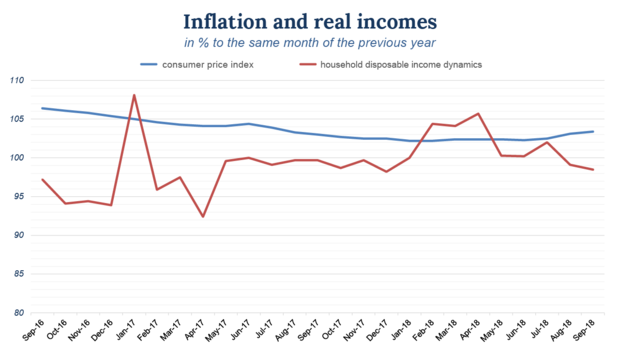Paradox of economy: Russians' wages rising, but incomes falling
Fall in real incomes accelerated in September. Recovery period is over
The recovery period of real incomes of Russians, which lasted 7 months, seems to have come to an end. Due to inflation, the August drop in revenues not only did not stop, but even accelerated: it amounted to 1,5% in September. At the same time, wages continue to grow at a high rate. The overall annual dynamics of real income remains positive, but it is decelerating and may soon come to naught. Read more in the material of Realnoe Vremya.
Salary growth did not help
In September, the wage growth in Russia accelerated and has turned out to be one of the highest since the beginning of this year (it was higher only in February). Compared to September 2017, nominal wages increased by 10,8%, and in total over nine months — by 11,1%. In real terms, the growth was also higher than in August.
Meanwhile, the statistics on real disposable income of the population were not positive at all. The drop in income that had begun a month earlier, not only did not stop, but accelerated. In September, the disposable income of the population in annual terms decreased by 1,5% after the August fall by 0,9%. The dynamics of real income accumulated over the year remains positive (+1,7% in January-September), although it is decelerating rapidly month on month.
The state of incomes is pressured by a sharp acceleration of inflation — in September it reached a maximum level in the last 14 months, amounting to 3,4%. All groups of goods, except fruit and vegetable products, rose in price. The ministry of economic development expects that the inflation to add another 0,4-0,5% in October.
Chief Economist at Expert RA Agency Anton Tabakh names two more factors of the fall of the real disposable incomes. This is a reduction in income from entrepreneurship activities and financial instruments such as deposits. In the case of deposits, the situation may change, as their rates have begun to grow.
A divergence in trends in real incomes and wages (they form about 65% of income) has also been observed before. Experts say that the difference may be due to the weak dynamics of pensions, a decrease in investment income, as well as a reduction in earnings in grey economy.

No ''for'' factor
This January has been the first month when the fall in real incomes of Russians stopped — before the end of 2014, the real disposable incomes had almost been continuously declining for 38 months. The recovery period thus lasted 7 months, from January to July; according to some economists, it is done with it now.
 ''The recovery of incomes, which was observed in the first half of the year, was largely due to the elections. Now the period of growth can be considered completed,'' says Anton Tabakh. ''However, it is better to look not at monthly changes, but at the overall dynamics for the year. In this sense, there is a feeling that real incomes will stagnate — growth will be approximately at the level of inflation.''
''The recovery of incomes, which was observed in the first half of the year, was largely due to the elections. Now the period of growth can be considered completed,'' says Anton Tabakh. ''However, it is better to look not at monthly changes, but at the overall dynamics for the year. In this sense, there is a feeling that real incomes will stagnate — growth will be approximately at the level of inflation.''
The prospects for real incomes are not so unambiguous, says head of the analytical department at Dokhod financial group Vladimir Kiselev. According to him, in the future revenues will not necessarily decrease — they can be supported, in particular, by enhanced indexation of pensions. In addition, taking into account the growth of rates in the economy, property income may increase.
Falling revenues dragged the retail sector with them, the growth of which slowed from 2,8% in August to 2,2% in September. Sociologists, in turn, point at a decrease in consumer confidence, as a result of which the population seeks to save. This also does not help retailing.
According to Romir research holding, last month the daily expenses of Russians minus inflation were the lowest since 2012. In general, the September results of retail trade and consumer spending have been among the weakest this year, analysts of Raiffeisenbank say.
''In the next few months, we do not see any significant positive factor that could support consumer confidence or incomes of the population,'' they write. In their opinion, the dynamics of disposable income of the population for the entire year 2018 will be zero.